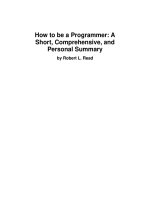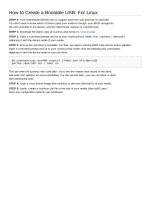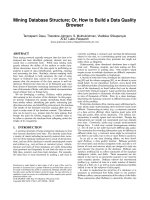How to visualize a single decision tree from the random forest in scikit learn (python) mljar (1)
Bạn đang xem bản rút gọn của tài liệu. Xem và tải ngay bản đầy đủ của tài liệu tại đây (2.73 MB, 7 trang )
How to visualize a single Decision Tree from the Random Forest in Scik...
1 of 7
mljar
/>
Mercury
AutoML
Blog
GitHub
How to visualize a single
Decision Tree from the
Random Forest in Scikit-Learn
(Python)?
June 29, 2020 by Piotr Płoński
Random forest
The Random Forest is an esemble of Decision Trees. A single Decision Tree can be
easily visualized in several different ways. In this post I will show you, how to visualize
a Decision Tree from the Random Forest.
First let’s train Random Forest model on Boston data set (it is house price regression
task available in scikit-learn ).
# Load packages
import pandas as pd
from sklearn.datasets import load_boston
from sklearn.ensemble import RandomForestRegressor
from sklearn import tree
from dtreeviz.trees import dtreeviz # will be used for tree visualization
from matplotlib import pyplot as plt
plt.rcParams.update({'figure.figsize': (12.0, 8.0)})
plt.rcParams.update({'font.size': 14})
Load the data and train the Random Forest.
boston = load_boston()
X = pd.DataFrame(boston.data, columns=boston.feature_names)
y = boston.target
Let’s
set the
in the forest
to 100
(itwebsite,
is a default
n_estiamtors
):
This site
usesnumber
cookies.ofIftrees
you continue
browsing
our
youof
accept
these cookies.
More info
Accept
16/05/2023, 15:04
How to visualize a single Decision Tree from the Random Forest in Scik...
2 of 7
/>
rf = RandomForestRegressor(n_estimators=100)
rf.fit(X, y)
RandomForestRegressor(bootstrap=True, ccp_alpha=0.0, criterion='mse',
max_depth=None, max_features='auto', max_leaf_nodes=Non
max_samples=None, min_impurity_decrease=0.0,
min_impurity_split=None, min_samples_leaf=1,
min_samples_split=2, min_weight_fraction_leaf=0.0,
n_estimators=100, n_jobs=None, oob_score=False,
random_state=None, verbose=0, warm_start=False)
Decision Trees are stored in a list in the estimators_ attribute in the rf model.
We can check the length of the list, which should be equal to n_estiamtors value.
len(rf.estimators_)
>>> 100
We can plot a first Decision Tree from the Random Forest (with index 0 in the list):
plt.figure(figsize=(20,20))
_ = tree.plot_tree(rf.estimators_[0], feature_names=X.columns, filled
This site uses cookies. If you continue browsing our website, you accept these cookies.
More info
Accept
16/05/2023, 15:04
How to visualize a single Decision Tree from the Random Forest in Scik...
3 of 7
/>
Do you understand anything? The tree is too large to visualize it in one figure and
make it readable.
Let’s check the depth of the first tree from the Random Forest:
rf.estimators_[0].tree_.max_depth
>>> 16
Our first tree has max_depth=16 . Other trees have similar depth. To make
visualization readable it will be good to limit the depth of the tree. In MLJAR’s opensource AutoML package mljar-supervised the Decision Tree’s depth is set to be in
range from 1 to 4. Let’s train the Random Forest again with max_depth=3 .
rf = RandomForestRegressor(n_estimators=100, max_depth=3)
rf.fit(X, y)
RandomForestRegressor(bootstrap=True, ccp_alpha=0.0, criterion='mse',
max_depth=3, max_features='auto', max_leaf_nodes=None,
max_samples=None, min_impurity_decrease=0.0,
min_impurity_split=None, min_samples_leaf=1,
min_samples_split=2, min_weight_fraction_leaf=0.0,
n_estimators=100, n_jobs=None, oob_score=False,
random_state=None, verbose=0, warm_start=False)
The plot of first Decision Tree:
_ = tree.plot_tree(rf.estimators_[0], feature_names=X.columns, filled
This site uses cookies. If you continue browsing our website, you accept these cookies.
More info
Accept
16/05/2023, 15:04
How to visualize a single Decision Tree from the Random Forest in Scik...
4 of 7
/>
We can use dtreeviz package to visualize the first Decision Tree:
viz = dtreeviz(rf.estimators_[0], X, y, feature_names=X.columns, target_name
viz
<
≥
Summary
I show you how to visualize the single Decision Tree from the Random Forest. Trees
can be accessed by integer index from estimators_ list. Sometimes when the tree is
too deep, it is worth to limit the depth of the tree with max_depth hyper-parameter.
What is interesting, limiting the depth of the trees in the Random Forest will make the
final model much smaller in terms of used RAM memory and disk space needed to
save the model. It will also change the performance of the default Random Forest
(with full trees), it will help or not, depending on the data set.
« Random Forest Feature Importance Computed
in 3 Ways with Python
How many trees in the Random Forest? »
This site uses cookies. If you continue browsing our website, you accept these cookies.
More info
Accept
16/05/2023, 15:04
How to visualize a single Decision Tree from the Random Forest in Scik...
5 of 7
/>
Convert Python Notebooks to Web Apps
We are working on open-source framework Mercury for converting
Jupyter Notebooks to interactive Web Applications.
Read more
This site uses cookies. If you continue browsing our website, you accept these cookies.
More info
Accept
16/05/2023, 15:04
How to visualize a single Decision Tree from the Random Forest in Scik...
6 of 7
/>
Articles you might find interesing
1. 8 surprising ways how to use Jupyter Notebook
2. Create a dashboard in Python with Jupyter Notebook
3. Build Computer Vision Web App with Python
4. Develop NLP Web App from Python Notebook
5. Build dashboard in Python with updates and email notifications
6. Share Jupyter Notebook with non-technical users
Join our newsletter
Subscribe to our newsletter to receive product updates
Subscribe
This site uses cookies. If you continue browsing our website, you accept these cookies.
More info
Accept
16/05/2023, 15:04
How to visualize a single Decision Tree from the Random Forest in Scik...
7 of 7
mljar
Outstanding Data
Science Tools
/>
Blog
Mercury
About
AutoML
Brand Assets
Pricing
GitHub
Compare Algorithms
AutoML Comparison
Decision Tree vs Random Forest
What is AutoML?
Random Forest vs Xgboost
Golden Features
Xgboost vs LightGBM
K-Means Features
CatBoost vs Xgboost
Feature Selection
© 2023 MLJAR, Sp. z o.o. • Terms of service • Privacy policy • EULA • Contact •
This site uses cookies. If you continue browsing our website, you accept these cookies.
More info
Accept
16/05/2023, 15:04









